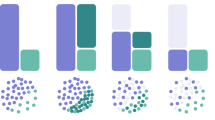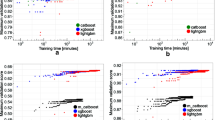Abstract
Background/Introduction
Data classification is an important application in the domain of cognitive computation, which has various applications. In this paper, we use classification techniques to solve some key issues in answering range query over probabilistic data. The key of answering this query is to store the feature of each uncertain object in a lightweight structure and use these structures for pruning/validating. However, in these works, the costly integral calculation has to be carried out when dealing with objects that cannot be pruned/validated, and some of the structure construction algorithms are not general.
Methods
In this paper, we employ ELM, a popular classification technique, to tackle the above issues. Our proposed methods are as follows: We firstly propose a new query called PDR (short for probabilistic degree range) query to substitute the traditional prob-range query, which helps us avoid the costly integral calculation. We propose an ELM-based “adapter” to construct the lightweight structure for uncertain data in a more general manner. We design the GO-ELM algorithm for answering PDR query. It first avoids most of the integral calculation via using a group of bit vector-based filter. In addition, we propose an ELM-based classifier, which is designed to further avoid integral operations.
Results
From the experiment results, we find that: (1) our ELM-based adapter is superior compared with both SVM-based and DNN-based adapter due to its better training efficiency and classification efficiency as well; (2) the performance of H-MRST is better than that of U-tree and UD-tree; and (3) ELM-filter could effectively avoid integral calculation.
Conclusions
This paper studies the problem of PDR query over uncertain data. We firstly define PDR query and propose a general scheme to handle uncertain object if its PDF is discrete. We then design GO-ELM algorithm for answering PDR query. Our experiments faithfully demonstrated the efficiency of our indexing techniques.







Similar content being viewed by others
References
Cao K, Wang G, Han D, Ning J, Zhang X. Classification of uncertain data streams based on extreme learning machine. Cognit Comput. 2015;7(1):150–60.
Mital PK, Smith TJ, Hill RL, Henderson JM. Clustering of gaze during dynamic scene viewing is predicted by motion. Cognit Comput. 2011;3(1):5–24.
Wöllmer M, Eyben F, Graves A, Schuller BW, Rigoll G. Bidirectional LSTM networks for context-sensitive keyword detection in a cognitive virtual agent framework. Cognit Comput. 2010;2(3):180–90.
Han D, Yachao H, Ai S, Wang G. Uncertain graph classification based on extreme learning machine. Cognit Comput. 2015;7(3):346–58.
Poria S, Cambria E, Howard N, Huang G-B, Hussain A. Fusing audio, visual and textual clues for sentiment analysis from multimodal content. Neurocomputing. 2016;174:50–9.
Huang G-B, Chen L. Enhanced random search based incremental extreme learning machine. Neurocomputing. 2008;71:3460–8.
Huang G-B, Zhu Q-Y, Siew C-K. Extreme learning machine: theory and applications. Neurocomputing. 2006;70:489–501.
Huang G, Song S, Gupta JND, Wu C. Semi-supervised and unsupervised extreme learning machines. IEEE Trans Cybern. 2014;44(12):2405–417.
Poria S, Cambria E, Howard N, Huang G-B, Hussain A. Power utility nontechnical loss analysis with extreme learning machine method. IEEE Trans Power Syst. 2008;23:946–55.
Tong Y, Chen L, Ding B. Discovering threshold-based frequent closed itemsets over probabilistic data. In: IEEE 28th international conference on data engineering (ICDE 2012), Washington, DC, USA (Arlington, VA), 1–5 April, 2012, 2012. p. 270–81.
Tong Y, Cao CC, Chen L. TCS: efficient topic discovery over crowd-oriented service data. In: The 20th ACM SIGKDD international conference on knowledge discovery and data mining (KDD’14), New York, NY, USA—August 24–27, 2014, 2014. p. 861–70.
Tong Y, Chen L, She J. Mining frequent itemsets in correlated uncertain databases. J Comput Sci Technol. 2015;30(4):696–712.
Tong Y, Zhang X, Cao CC, Chen L. Efficient probabilistic supergraph search over large uncertain graphs. In: Proceedings of the 23rd ACM international conference on conference on information and knowledge management (CIKM 2014), Shanghai, China, November 3–7, 2014, 2014. p. 809–18.
Tao Y, Cheng R, Xiao X, Ngai WK, Kao B, Prabhakar S. Indexing multi-dimensional uncertain data with arbitrary probability density functions. In: VLDB, 2005. p. 922–33.
Zhu R, Wang B, Wang G. Indexing uncertain data for supporting range queries. In: Proceedings of the Web-age information management—15th international conference (WAIM 2014), Macau, China, June 16–18, 2014, 2014. p. 72–83.
Zhang Y, Zhang W, Lin Q, Lin X. Effectively indexing the multi-dimensional uncertain objects for range searching. In: EDBT, 2012. p. 504–15.
Zhang Y, Lin X, Zhang W, Wang J, Lin Q. Effectively indexing the uncertain space. IEEE Trans Knowl Data Eng. 2010;22(9):1247–61.
Kalashnikov DV, Ma Y, Mehrotra S, Hariharan R. GIS: Index for fast retrieval of uncertain spatial point data. In: 2006. p. 195–202.
Cao K, Wang G, Han D, Bai M, Li S. An algorithm for classification over uncertain data based on extreme learning machine. Neurocomputing. 2016;174:194–202.
Bi X, Zhao X, Wang G, Zhang P, Wang C. Distributed extreme learning machine with kernels based on MapReduce. Neurocomputing, 2014;149:456–63.
Huang G-B, Zhu Q-Y, Siew C-K. Extreme learning machine: a new learning scheme of feedforward neural networks. In: International symposium on neural networks. 2004; p.2:
Wang G, Bi X, Gong P, Zhao Y. XML document classification based on ELM. Neurocomputing. 2011;74:2444–51.
Poria S, Cambria E, Hussain A, Huang G-B. Towards an intelligent framework for multimodal affective data analysis. Neural Netw. 2015;63:104–16.
Huang G-B, Zhu Q-Y, Mao KZ, Siew C-K, Saratchandran P, Sundararajan N. Can threshold networks be trained directly? IEEE Trans Circuits Syst II Analog Digit Signal Process. 2006;53:187–91.
Feng G, Huang G-B, Lin Q, Gay RKL. Error minimized extreme learning machine with growth of hidden nodes and incremental learning. IEEE Trans Neural Netw. 2009;20:1352–7.
Rong H-J, Huang G-B, Sundararajan N, Saratchandran P. Online sequential fuzzy extreme learning machine for function approximation and classification problems. IEEE Trans Syst Man Cybern. 2009;39::1067–72.
Huang G-B, Chen L. Convex incremental extreme learning machine. Neurocomputing. 2007;70:3056–62.
Huang G-B, Zhou H, Ding X, Zhang R. Extreme learning machine for regression and multiclass classification. IEEE Trans Syst Man Cybern. 2012;42:513–29.
Huang G-B, Chen L, Siew CK. Universal approximation using incremental constructive feedforward networks with random hidden nodes. IEEE Trans Neural Netw. 2006;17:879–92.
Acknowledgments
The work is partially supported by the National Natural Science Foundation of China (Nos. 61322208, 61572122, 61272178, 61532021, 01401256).
Author information
Authors and Affiliations
Corresponding author
Ethics declarations
Conflict of Interest
Bin Wang, Rui Zhu, Shiying Luo, Xiaochun Yang and Guoren Wang declare that they have no conflict of interest.
Informed Consent
Informed consent was obtained from all individual participants included in the study.
Human and Animal Rights
This article does not contain any studies with human participants or animals performed by any of the authors.
Rights and permissions
About this article
Cite this article
Wang, B., Zhu, R., Luo, S. et al. H-MRST: A Novel Framework For Supporting Probability Degree Range Query Using Extreme Learning Machine. Cogn Comput 9, 68–80 (2017). https://doi.org/10.1007/s12559-016-9435-3
Received:
Accepted:
Published:
Issue Date:
DOI: https://doi.org/10.1007/s12559-016-9435-3




